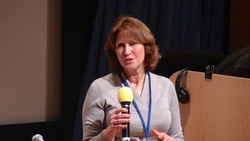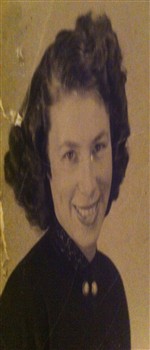 | | Poverty of the Heart | | Speaking at the UN Ingrid Stellmacher explores 'Poverty of the Heart' and launches the Dignity Diaries, as a tool to discover what dignity in toay's world really means.
More ...
|
 | | World Heart Day | | On World Heart Day Ingrid writes about the other heart that's just as important for our survival and the need to recognise it.
More ...
|
| | |
|
Remembrance & reconciliation of memories - World War II

Adele Bernard (c) I G Stellmacher
'When truth and mercy meet, peace and reconciliation have kissed'
There was no need for a radio message telling my mother the Americans were coming to liberate them that day, she could see them. Surging up the drive of the chateau her family had been evacuated to after her home was bombed into oblivion. That it was American planes that dropped those bombs no longer mattered. American soldiers were here, now, and they were smiling. Families were runing outside to see them, for the sound of their boots was not something to fear, it was something to welcome. They brought protection. They brought hope - of peace.
'I was delerious with hope' my mother told me. 'I thought my head would explode with joy!'
My mother was 19 years-old the day those soldiers marched up that Normandy drive. She ran to the first one she saw, threw her arms around his neck and kissed him. It was a dream moment she would never forget. As was the injustice of being banned from joining her two brothers in the drunken celebration that followed that night. Enforced by a concerned mother who trusted neither the soldiers nor her daughter to not loose themselves to such a momentous moment that she might forever regret. Recalling that day yeaes kater my mother secretly confessed to me that she was probably right!
Her house in the small town of St Cyr L'ecole had disappeared into a crater so vast that day, people came from the far side of town just to peer into the hole where her house once stood, and the life she had known with it. Just 2 months before the war would finally end.
That was 80 years ago and while I wasn't there to witness what took place that day, I have relived that story through my mother’s eyes every time she shared it
sitting at the kitchen table as if I was. Some small detail added and new emotion revealed with every telling, adding more colour to the canvas like some giant masterpiece. Visceral, real and immediate, with a powerful energy of its own. A legacy, living on in every gesture and every tear until one day my mother confessed that she thought about that kiss and that soldier, so often wondering what happened to him. If he made it back home alive.
"He was about the same age as me" she recalls. "Did he live or did he die after coming all that way for us? She asks herself as much as me while searching for an answer inside my eyes somehow, as if I might know. I wish I did but my response was always the same:
"I hope he lived mum. I’d like to think he did."
At the National World War II memorial in Washington DC, one veterans day, I sat in the midst of emotional scenes of aging men in wheel chairs, sharing war stories about their time in France with children, grandchildren comrades and friends around them and suddenly I found myself looking into the faces of these men. Their medals and their memories proudly on display wondering if one of them might be him?
“We could tell the difference between British and American planes by the sound of their engines”, my mother would explain. “If they were British we would carry on playing cards or reading but if they were American we would run to the shelter like lightening because we knew they would drop their bombs anywhere just to get away from the Germans, make their planes lighter and stretch their fuel further.”
It isn’t only the image of the crater carved into my mother’s memory but that of her next-door neighbour and her severed hands dangling from the wire fence
the separated their large gardens. The rings she wore on every finger removed by the time my mother returned the following day. The woman living there had lost her husband, her sons, her entire family and stubbornly refused to leave her house during those raids. She had ‘nothing left to live for’ she told neighbours repeatedly and would rather die in her own home than in a shelter full of strangers. She got her wish. Someone else got her rings and hopefully benefited beyond simply wearing them.
My mother’s bitterness about the war and hatred towards the Germans remained undiminished until decades later when I lived in Frankfurt and got to know individual Germans through me and finally conceeded that the young could not be blamed for the actions of the older generation. I had a sense of her needing to justify my being in a country living with a people she loathed and a need to reconcile her emotions with my actions. I have no doubt that the stories I told her about the people I knew, of the friends I made, and the shame that some of them shared still with me about the war, opened a new door onto solid ground.
Revisiting the story of that kiss and her time at the chateau, my mother related how she and the other evacuated families had to share the building with the Germans who were housed in the stable blocks as barracks.
Living side by side was uncomfortable. One day a soldier came to my mother’s aid when trying to rescue a broach from the river running through the grounds. Though she refused his help at first it was her mother who made sense of the situation and how that young German soldier was forced into being there too and allowed him to help.
"I don't want to kill you," he said, "I don't want to kill anything - anyone. But they send me. They take my life and they send me from my family. For what? It's mad."
War is mad. When humanity turns on itself everyone loses and the cry for recovery reaches down through the generations without end. Recollection and reconciliation is a painful process. For some it is impossible even now. For others like my mother who cannot change history, she can change her relationship with her memories and in doing so shift her perspective and understanding to reconcile in some small way what life has revealed over the years. It is not just what happens in the midst of it, but what we do with it that matters.
'When truth and mercy meet, peace and reconciliation have kissed". (Psalm 84 1:1).
|
| |
|
aa (Guest) |
14/06/2020 22:39 |
aa
|
|
|
|
| |
|